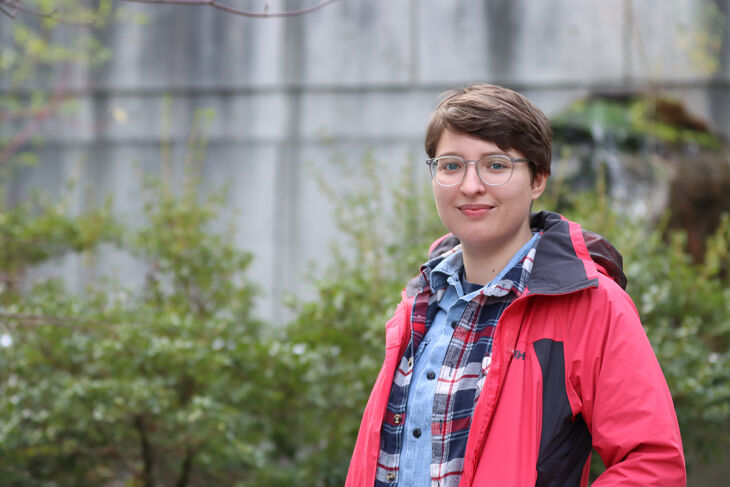VIU alum Misha Zvekic’s research on microplastics and the effects of exposure to light was recently published by the Royal Society of Chemistry.
Microplastics are everywhere – in the oceans, rivers and the air you breathe – and are being ingested by various animals and other organisms. And while microplastics are already problematic on their own, they can also absorb toxins and other harmful chemical pollutants in the environment.
“Because microplastics are so small there is a potential that they could affect us all. There is a lot of concern about how microplastics and the chemicals added to them could potentially interfere with our biological and environmental functions. It’s not a problem we want to stay in the dark about,” says Misha Zvekic, who graduated last year from Vancouver Island University (VIU) with a Bachelor of Science, double major in Chemistry and Biology.
Zvekic has been investigating microplastics as an undergraduate researcher at VIU since 2018 and is currently completing a master’s degree in Chemistry at the University of Victoria at VIU’s Applied Environmental Research Laboratories (AERL). Zvekic is the lead author of the research paper Characterizing photochemical ageing process of microplastic materials using multivariate analysis of infrared spectra, published by the Royal Society of Chemistry. The paper was co-authored by Drs. Larissa Richards, Christine Tong and Erik Krogh, in VIU’s Chemistry department. The paper is based on the undergraduate research Zvekic undertook at VIU.
“It feels so great to finally get it published because some of this work is from the first chemistry project that I was able to work on at VIU with the help of a VIU REACH Award,” Zvekic says.
Zvekic’s research investigated how exposure to sunlight changes the surface properties of plastics. In addition to causing them to break down into smaller pieces, Zvekic says when plastics are exposed to sunlight it changes their chemical structure which affects how they interact with other pollutants.
Organisms can potentially eat these plastics and be exposed to whatever other pollutants the plastic might have picked up along the way. Zvekic generated a unique data set by exposing several common plastics to both natural and artificial light for up to six months in order to examine the differences.
“We were able to compare lab-based experiments to real-world weathering in a way that hasn’t been done before,” Zvekic says. “This comparison can help researchers understand how plastics change in the environment. I am working on a second paper now where we study the interaction of plastics with chemical contaminants in water. Thanks to the work we just published, we have a better understanding of how these weathering processes affect the fate and distribution of other contaminants in the environment.”
Zvekic is currently completing their master’s research with Krogh, funded by the Natural Sciences and Engineering Research Council of Canada (NSERC).
“Misha spearheaded several interesting projects as an undergraduate student at VIU. Their academic pursuits in biology and chemistry provided an excellent foundation for this work. It is a rare accomplishment for an undergraduate student to be lead author on a scientific paper,” Krogh says.
During their time studying at VIU, Zvekic acquired numerous research awards and recognition including the VIU REACH Award, the NSERC Undergraduate Student Research Award three years in a row, and an NSERC Canada Graduate Scholarship – Master’s Program.
Zvekic was also among the first cohort of students to graduate from VIU’s Major in Chemistry degree, which has a unique focus on biological and environmental chemistry.
-30-
Media Contact:
Rachel Stern, Communications Officer, Vancouver Island University
C: 250.618.0373 l E: [email protected] | T: @VIUNews

















